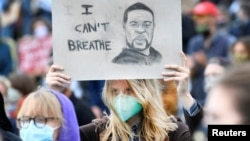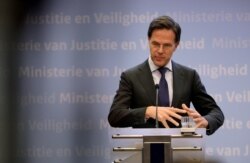Prime Minister Mark Rutte met Wednesday with Dutch Black Lives Matter protesters to discuss how best to tackle racism and entrenched inequality in the Netherlands.
Rutte invited a small group to his official residence in The Hague, but they didn't include organizers of mass Black Lives Matter protests or members of the action group Kick Out Black Pete, which has campaigned for years against the children's character, who is often portrayed by white people in blackface makeup.
"We think it's more a PR stunt than a serious conversation about combating racism," said Mitchell Esajas, who is part of the Kick Out Black Pete group and the Black Lives Matter movement in the Netherlands and wasn't invited to the talks.
Rutte said after the meeting that he had agreed to keep talking about the issue of racism, including with leaders of the two movements.
He said he wants to use the wave of anger and activism unleashed by images of George Floyd's death in the U.S. to effect change. Floyd, a Black man who cried out that he couldn't breathe as a white Minneapolis officer pressed a knee to his neck for over eight minutes, died on May 25.
"Clearly all the things we're already doing to tackle discrimination and racism is not enough," he said.
One of the Black activists involved in the talks, Gideon Everduim, said he had a clear message for Rutte.
"I told the premier that it is time for leadership," he said. "That there is a big difference between racism and discrimination. The premier thought racism was something that happened in our heads and I had to make clear to him that it is something in the system."
Everduim said stamping out racism needs to begin with a clear understanding of the issue.
"We have to start with education," he said. "If you don't know what racism really is, you can't eradicate it."
In recent years, much of the polarized Dutch debate about race has revolved around Black Pete, but since Floyd's death it has broadened to cover racism and injustice throughout society.
Earlier this month, Rutte conceded that racial inequality wasn't only a problem in the United States.
"There are also people living in the Netherlands who in that regard feel that they don't fully fit in, that they can't play a full role in this society," he said. "That is also a Dutch problem. There is racism here, too. There is discrimination here, too."
Black people, other minorities and the national human rights watchdog say the problem is ingrained in society.
A June 10 report by the Netherlands Institute for Human Rights said that discrimination in public places — based on factors including skin color, religion and sexual orientation — is a "structural" problem. The institute urged the government to appoint a coordinator to tackle the problem.
Advocates say Dutch minorities face inequality, including racial profiling, police brutality and discrimination at work, schools and when trying to rent a home.
In May, the Dutch government took the unusual step of asking prosecutors to investigate the country's tax office for possible discrimination amid reports that tax officials used racial profiling to target possible fraudsters. And over the weekend, police said they were investigating a threatening letter sent to one of the most prominent anti-Black Pete activists.
Rutte said he discussed Black Pete at the talks, but it wasn't the main issue.
"It was really about how can we in the Netherlands use the energy that has been unleashed worldwide and certainly in this country by the terrible images from America," he said. "How can we use that to deliver an enormous blow against these terrible phenomena of discrimination, racism, exclusion."





